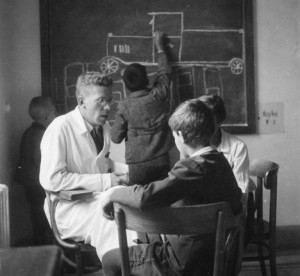About Autism
Autism is a developmental disability that affects how we experience the world around us. Autistic people are an important part of the world. Autism is a normal part of life, and makes us who we are.
Autism has always existed. Autistic people are born autistic and we will be autistic our whole lives. Autism can be diagnosed by a doctor, but you can be autistic even if you don’t have a formal diagnosis. Because of myths about autism, it can be harder for autistic adults, autistic girls, and autistic people of color to get a diagnosis. But anyone can be autistic, regardless of race, gender, or age.
Autistic people are in every community, and we always have been. Autistic people are people of color. Autistic people are immigrants. Autistic people are a part of every religion, every income level, and every age group. Autistic people are women. Autistic people are queer, and autistic people are trans. Autistic people are often many of these things at once. The communities we are a part of and the ways we are treated shape what autism is like for us.
There is no one way to be autistic. Some autistic people can speak, and some autistic people need to communicate in other ways. Some autistic people also have intellectual disabilities, and some autistic people don’t. Some autistic people need a lot of help in their day-to-day lives, and some autistic people only need a little help. All of these people are autistic, because there is no right or wrong way to be autistic. All of us experience autism differently, but we all contribute to the world in meaningful ways. We all deserve understanding and acceptance.
Every autistic person experiences autism differently, but there are some things that many of us have in common.
- We think differently. We may have very strong interests in things other people don’t understand or seem to care about. We might be great problem-solvers, or pay close attention to detail. It might take us longer to think about things. We might have trouble with executive functioning, like figuring out how to start and finish a task, moving on to a new task, or making decisions.Routines are important for many autistic people. It can be hard for us to deal with surprises or unexpected changes. When we get overwhelmed, we might not be able to process our thoughts, feelings, and surroundings, which can make us lose control of our body.
- We process our senses differently. We might be extra sensitive to things like bright lights or loud sounds. We might have trouble understanding what we hear or what our senses tell us. We might not notice if we are in pain or hungry. We might do the same movement over and over again. This is called “stimming,” and it helps us regulate our senses. For example, we might rock back and forth, play with our hands, or hum.
- We move differently. We might have trouble with fine motor skills or coordination. It can feel like our minds and bodies are disconnected. It can be hard for us to start or stop moving. Speech can be extra hard because it requires a lot of coordination. We might not be able to control how loud our voices are, or we might not be able to speak at all–even though we can understand what other people say.
- We communicate differently. We might talk using echolalia (repeating things we have heard before), or by scripting out what we want to say. Some autistic people use Augmentative and Alternative Communication (AAC) to communicate. For example, we may communicate by typing on a computer, spelling on a letter board, or pointing to pictures on an iPad. Some people may also communicate with behavior or the way we act. Not every autistic person can talk, but we all have important things to say.
- We socialize differently. Some of us might not understand or follow social rules that non-autistic people made up. We might be more direct than other people. Eye contact might make us uncomfortable. We might have a hard time controlling our body language or facial expressions, which can confuse non-autistic people or make it hard to socialize.Some of us might not be able to guess how people feel. This doesn’t mean we don’t care how people feel! We just need people to tell us how they feel so we don’t have to guess. Some autistic people are extra sensitive to other people’s feelings.
- We might need help with daily living. It can take a lot of energy to live in a society built for non-autistic people. We may not have the energy to do some things in our daily lives. Or, parts of being autistic can make doing those things too hard. We may need help with things like cooking, doing our jobs, or going out. We might be able to do things on our own sometimes, but need help other times. We might need to take more breaks so we can recover our energy.
Not every autistic person will relate to all of these things. There are lots of different ways to be autistic. That is okay!
Autism affects how we think, how we communicate, and how we interact with the world. Autistic people are different than non-autistic people, and that’s okay.
Cited from ASAN
ASAN advocates for a world where all autistic people have equal access, rights, and opportunities. Nothing About Us, Without Us!
Asperger History
Note: that Aspergers has been removed from the DSM and now falls under Autism Spectrum Disorders, There is also controversy around Hans Aspergers. ANSWER continues the use of Aspergers for those that still feel a strong connection to their diagnoses, we care for all who have autism.
Asperger’s Disorder is one of five Pervasive Development Disorders (PDDs), which also includes Autism, Rett’s Syndrome, Childhood Disintegrative Disorder, and PDD-Not Otherwise Specified (PDD-NOS). PDDs are a category of neurologically-based disorders that have a range of delays in different developmental stages.
Asperger’s Disorder as first described in the 1940s by Viennese pediatrician Hans Asperger who observed autistic-like behaviors and difficulties with social and communication skills in boys who had normal intelligence and language development. Many professionals felt  Asperger’s Disorder was simply a milder form of autism and used the term “high-functioning autism” to describe these individuals. Professor Uta Frith, with the Institute of Cognitive Neuroscience of University College London and author of Autism and Asperger’s Syndrome, describes individuals with Aspergers Disorder as “having a dash of Autism.” Aspergers Disorder was added to the American Psychiatric Association’s Diagnostic and Statistical Manual of Mental Disorders (DSM-IV) in 1994 as a separate disorder from autism. However, there are still many professionals who consider Asperger’s Disorder a less severe form of Autism.
Asperger’s Disorder was simply a milder form of autism and used the term “high-functioning autism” to describe these individuals. Professor Uta Frith, with the Institute of Cognitive Neuroscience of University College London and author of Autism and Asperger’s Syndrome, describes individuals with Aspergers Disorder as “having a dash of Autism.” Aspergers Disorder was added to the American Psychiatric Association’s Diagnostic and Statistical Manual of Mental Disorders (DSM-IV) in 1994 as a separate disorder from autism. However, there are still many professionals who consider Asperger’s Disorder a less severe form of Autism.
What distinguishes Asperger’s Disorder from autism is the severity of the symptoms and the absence of language delays. Children with Asperger’s Disorder may be only mildly affected and frequently have good language and cognitive skills. To the untrained observer, a child with Asperger’s Disorder may just seem different.
Children with autism are frequently seen as aloof and uninterested in others. This is not the case with Asperger’s Disorder. Individuals with Asperger’s Disorder usually want to fit in and have interaction with others; they simply don’t know how to do it. They may be socially awkward, not understanding conventional social rules, or may show a lack of empathy. They may have limited eye contact, seem to be unengaged in a conversation, and not understand the use of gestures.
 Interests in a particular subject may border on the obsessive. Children with Asperger’s Disorder frequently like to collect categories of things, such as rocks or bottle caps. They may be proficient in knowing categories of information, such as baseball statistics or Latin names of flowers. While they may have good rote memory skills, they have difficulty with abstract concepts.
Interests in a particular subject may border on the obsessive. Children with Asperger’s Disorder frequently like to collect categories of things, such as rocks or bottle caps. They may be proficient in knowing categories of information, such as baseball statistics or Latin names of flowers. While they may have good rote memory skills, they have difficulty with abstract concepts.
One of the major differences between Asperger’s Disorder and autism is that, by definition, there is no speech delay in Asperger’s. In fact, children with Asperger’s Disorder frequently have good language skills; they simply use language in different ways. Speech patterns may be unusual, lacking inflection or having a rhythmic nature. Speech may be formal and too loud or high pitched. Children with Asperger’s Disorder may not understand the subtleties of language, such as irony and humor, or may not understand the give and take nature of a conversation.
Another distinction between Asperger’s Disorder and autism concerns cognitive ability. While some individuals with Autism experience mental retardation, by definition a person with Asperger’s Disorder cannot possess a “clinically significant” cognitive delay. This does not imply that all individuals with autism have mental retardation. Some do and some do not, but a person with Asperger’s Disorder possesses average to above average intelligence.
While motor difficulties are not a specific criteria for Aspergers, children with Asperger’s Disorder frequently have motor skill delays and may appear clumsy or awkward.
Cited from the Autism Society of America
